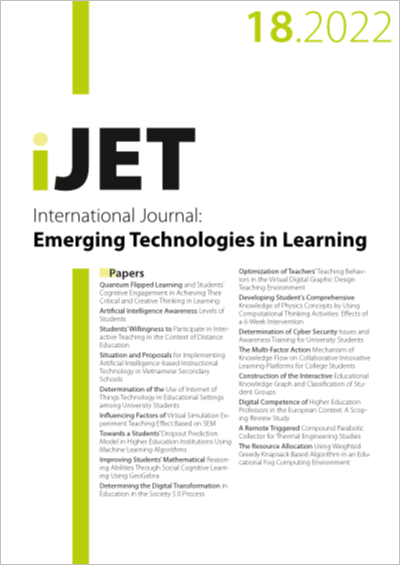Improving Students’ Mathematical Reasoning Abilities Through Social Cognitive Learning Using GeoGebra
DOI:
https://doi.org/10.3991/ijet.v17i18.32151Keywords:
Mathematical Reasoning Ability, Social Cognitive Learning, Problem Based Learning, GeoGebra.Abstract
Abstract— There have been many studies on technology-supported learning based on cognitive theory in the literature. However, little is known about GeoGebra-assisted social cognitive learning in supporting students' reasoning abilities for online learning during the COVID-19 pandemic. This study aims to examine and analyze the differences in the improvement of students' mathematical reasoning abilities who follow GeoGebra-assisted social cognitive learning (Geo-SCL) and GeoGebra-assisted problem-based learning (Geo-PBL). This study used a quantitative method with a quasi-experimental nonequivalent pre-test post-test control-group design. The sample consisted of 70 students from XI SMA Negeri 8 in Bandung, Indonesia. Before and after therapy, research data were collected using a mathematical reasoning test consisting of 5 essay questions. Paired sample t-test analysis and independent t-test were used to answer the research hypothesis. The results of the study concluded that students who studied with Geo-SCL obtained a higher increase in mathematical reasoning abilities than students who studied with Geo-PBL, with the criteria for improving abilities in both classes being in the moderate category. Research findings related to the application of Geo-SCL can be an alternative learning model in online learning situations.
Downloads
Published
How to Cite
Issue
Section
License
Copyright (c) 2022 Habibi Ratu Perwira Negara, Wahyudin Wahyudin, Elah Nurlaelah, Tatang Herman

This work is licensed under a Creative Commons Attribution 4.0 International License.



